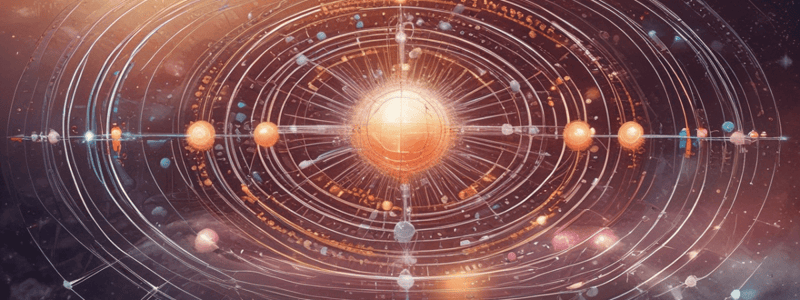Podcast
Questions and Answers
Which of the following is a result of pair annihilation?
Which of the following is a result of pair annihilation?
- Formation of two quarks
- Formation of two γ rays (correct)
- Formation of two mesons
- Formation of two baryons
Which of the following fundamental forces is not experienced by leptons?
Which of the following fundamental forces is not experienced by leptons?
- Electromagnetic force
- Weak nuclear force
- Strong nuclear force (correct)
- Gravitational force
A hadron that contains three up quarks is known as:
A hadron that contains three up quarks is known as:
- An electron
- A positron
- An anti-quark
- A proton (correct)
Which of the following is not a type of hadron?
Which of the following is not a type of hadron?
Which of the following statements is true about quarks and antiquarks?
Which of the following statements is true about quarks and antiquarks?
Which of the following is an example of a meson?
Which of the following is an example of a meson?
Which of the following particles is not classified as a lepton?
Which of the following particles is not classified as a lepton?
Which of the following is not a 'flavor' of quark?
Which of the following is not a 'flavor' of quark?
What is a characteristic of neutrinos?
What is a characteristic of neutrinos?
What is emitted along with an electron during beta decay?
What is emitted along with an electron during beta decay?
What is an antiparticle?
What is an antiparticle?
Study Notes
Particle Physics
- Pair annihilation occurs when a particle and its antiparticle collide, converting their mass into energy and producing two gamma rays.
- Leptons are indivisible point objects that do not experience the strong nuclear force, examples include electrons, positrons, and neutrinos.
Hadrons
- Hadrons are subatomic particles that experience all fundamental forces, including the strong nuclear force.
- Hadrons are composed of quarks, which are fundamental building blocks.
- Baryons are hadrons composed of three quarks or three antiquarks.
- Mesons are hadrons composed of a quark-antiquark pair.
Quarks
- Quarks come in six flavors: up (u), down (d), strange (s), charmed (c), top (t), and bottom (b).
- Each quark has a corresponding anti-quark with opposite charge and same mass.
Neutrinos
- Neutrinos are subatomic particles produced in beta decay with very little mass and no electric charge.
- Neutrinos are emitted during beta radiation along with an electron (beta particle).
- Neutrinos carry momentum and energy, conserving both quantities.
Antimatter
- Antimatter is composed of antiparticles, which are identical to particles in mass but opposite in electric charge.
- Each particle has its own antiparticle, such as the positron (antiparticle of the electron).
Particle Interactions
- When protons collide, the kinetic energy is converted into new particles, conserving electric charge, mass-energy, and momentum.
- Pair production occurs when a gamma photon creates a subatomic particle and its antiparticle, following the laws of conservation.
Studying That Suits You
Use AI to generate personalized quizzes and flashcards to suit your learning preferences.
Description
Learn about neutrinos, subatomic particles with little mass and no charge, produced during beta decay. Understand how neutrinos are emitted alongside electrons in beta radiation, conserving momentum and energy. Explore the equation for this process: 0n 1 → 1p 1 + −1e 0 + 0 0




